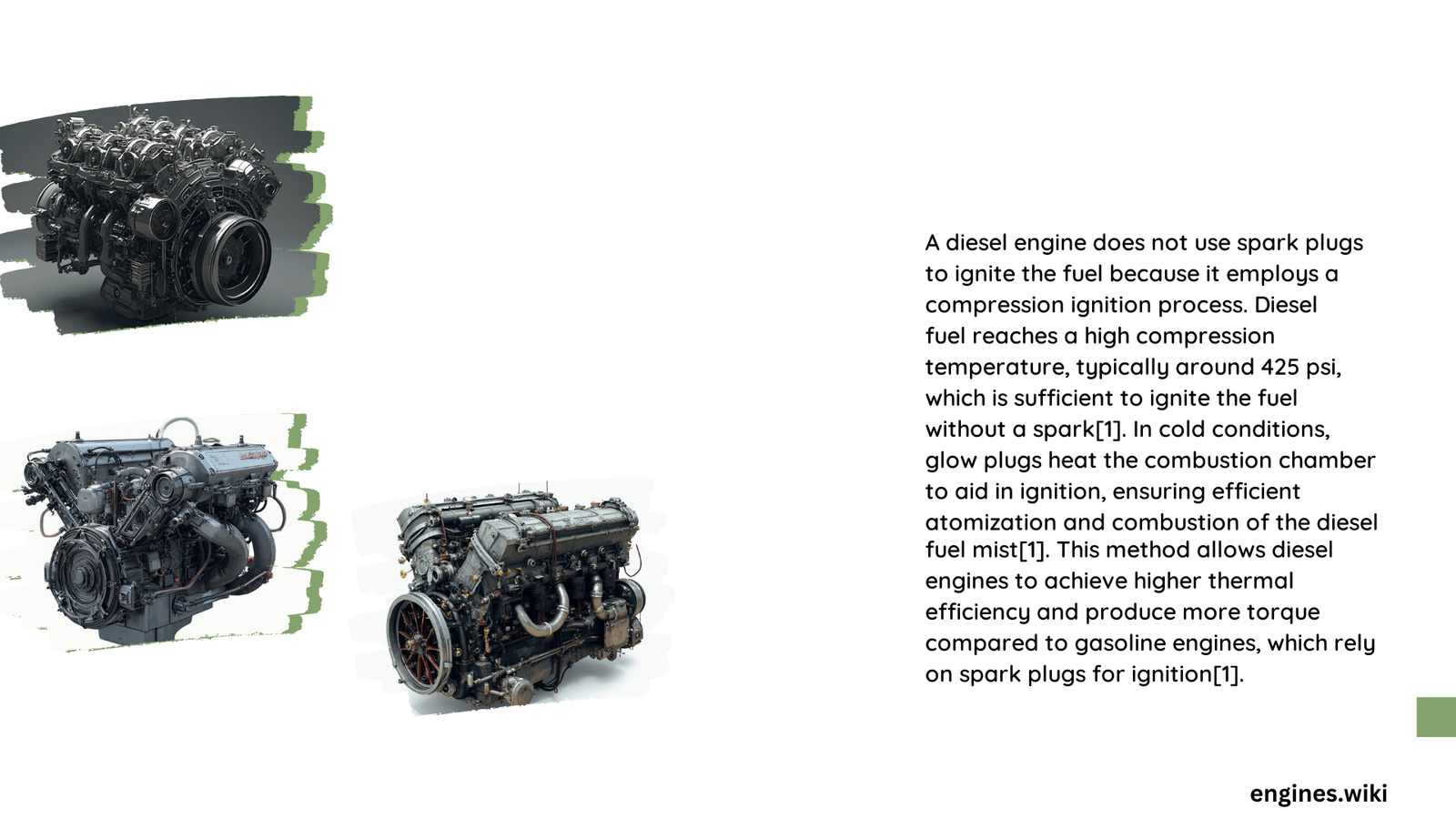Diesel engines operate on a unique principle that sets them apart from gasoline engines. Unlike their spark-ignited counterparts, diesel engines rely on compression ignition to combust fuel. This fundamental difference eliminates the need for spark plugs, a common component in gasoline engines. Instead, diesel engines use high compression ratios to generate the heat necessary for fuel ignition, resulting in a more efficient and robust combustion process.
How Does a Diesel Engine Ignite Fuel Without Spark Plugs?
The diesel engine’s ability to ignite fuel without spark plugs is rooted in its compression ignition system. This process involves several key steps:
- Air Intake: The engine draws in air through the intake valve.
- Compression: The piston compresses the air, raising its temperature significantly.
- Fuel Injection: Diesel fuel is injected into the hot, compressed air.
- Auto-ignition: The fuel spontaneously ignites due to the high temperature and pressure.
This compression ignition process is the cornerstone of diesel engine operation, enabling efficient fuel combustion without the need for spark plugs.
What Are the Key Components of a Diesel Engine’s Ignition System?

While diesel engines don’t use spark plugs, they rely on several critical components to ensure proper fuel ignition:
- High-pressure Fuel Injection System: This system precisely delivers fuel into the combustion chamber at the right moment and pressure.
- Compression Ratio: Diesel engines typically have compression ratios between 14:1 to 25:1, much higher than gasoline engines.
- Glow Plugs: These assist in cold starts by preheating the combustion chamber.
- Engine Control Unit (ECU): This computer manages fuel injection timing and other engine parameters.
Why Is High Compression Ratio Crucial in Diesel Engines?
The high compression ratio in diesel engines serves several essential functions:
- Heat Generation: It raises air temperature to 550-900°C (1022-1652°F), enabling auto-ignition.
- Improved Efficiency: Higher compression ratios lead to better thermal efficiency.
- Increased Power Output: More energy is extracted from each combustion cycle.
- Better Cold-Start Performance: Higher compression helps overcome cold-start issues.
How Does Fuel Injection Differ in Diesel Engines Compared to Gasoline Engines?
Diesel fuel injection systems are significantly different from those in gasoline engines:
| Aspect | Diesel Engine | Gasoline Engine |
|---|---|---|
| Injection Pressure | 1,000 to 30,000 psi | 40 to 60 psi |
| Injection Timing | Near top of compression stroke | During intake stroke or early compression |
| Fuel-Air Mixing | Occurs after fuel injection | Occurs before ignition |
| Injection System | Common rail or unit injectors | Port or direct injection |
What Are the Stages of Combustion in a Diesel Engine?
The diesel combustion process can be divided into four distinct stages:
- Ignition Delay: The period between fuel injection and the start of combustion.
- Premixed Combustion: Rapid burning of fuel that has mixed with air during the ignition delay.
- Diffusion Combustion: Controlled burning as fuel continues to mix with air.
- Late Combustion: Final stage where remaining fuel burns off.
How Do Glow Plugs Assist in Cold Starting Diesel Engines?
Glow plugs play a crucial role in cold-starting diesel engines:
- They preheat the combustion chamber to temperatures between 1,000°C to 1,300°C (1832°F to 2372°F).
- Activation occurs for a short duration before and after engine start.
- They ensure the combustion chamber is warm enough for efficient compression ignition in cold conditions.
What Are the Advantages of Compression Ignition in Diesel Engines?
Compression ignition in diesel engines offers several benefits:
- Higher Efficiency: Diesel engines typically achieve 30-35% thermal efficiency compared to 20-25% in gasoline engines.
- Greater Torque: The high compression ratio and fuel injection system deliver more low-end torque.
- Fuel Economy: Diesel engines generally provide better fuel economy than gasoline engines.
- Durability: The robust design required for high compression ratios often results in longer engine life.
How Does the Absence of Spark Plugs Affect Diesel Engine Maintenance?
The lack of spark plugs in diesel engines impacts maintenance in several ways:
- Reduced Ignition System Maintenance: No need for spark plug replacements or ignition wire services.
- Focus on Fuel System: More attention is required for fuel injector maintenance and fuel quality.
- Glow Plug Maintenance: Periodic checks and replacements of glow plugs are necessary for cold-start reliability.
- Higher Importance of Oil Quality: The high compression ratios put more stress on engine oil, requiring more frequent oil changes with high-quality diesel-specific oils.
What Are the Emissions Characteristics of Diesel Engines?
Diesel engines have distinct emissions characteristics:
- Higher NOx Emissions: Due to high combustion temperatures.
- Particulate Matter: Produces more soot compared to gasoline engines.
- Lower CO2 Emissions: Generally emit less CO2 per mile due to better fuel efficiency.
- Sulfur Dioxide: Can be an issue if using high-sulfur diesel fuel.
Modern diesel engines incorporate various technologies to reduce these emissions, including:
- Exhaust Gas Recirculation (EGR)
- Diesel Particulate Filters (DPF)
- Selective Catalytic Reduction (SCR)
How Has Diesel Engine Technology Evolved to Improve Performance and Emissions?
Diesel engine technology has seen significant advancements:
- Common Rail Injection: Allows for multiple injections per cycle, improving efficiency and reducing emissions.
- Turbocharging and Supercharging: Increases power output and efficiency.
- Electronic Control Systems: Provide precise control over fuel injection and other engine parameters.
- Advanced Materials: Allow for higher compression ratios and better heat management.
- Biodiesel Compatibility: Many modern diesel engines can run on biodiesel blends, reducing fossil fuel dependence.
In conclusion, the diesel engine’s unique compression ignition system, which does not use spark plugs to ignite the fuel, offers a range of benefits including higher efficiency, greater torque, and improved fuel economy. While this design presents some challenges in terms of emissions, ongoing technological advancements continue to address these issues, ensuring that diesel engines remain a viable and important power source for many applications.
